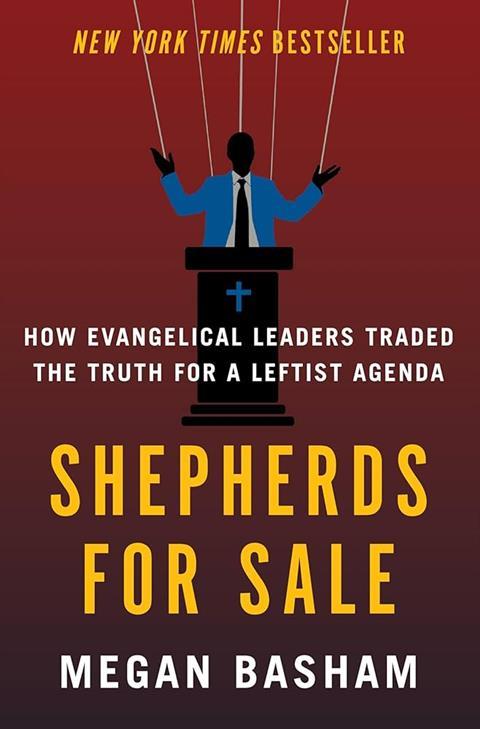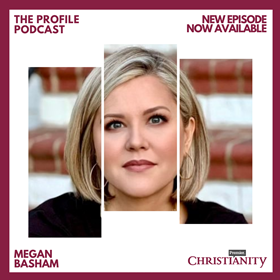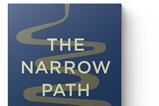Megan Basham’s Shepherds for Sale is one of the most controversial books to emerge from the US Church in recent years
Shepherds for Sale has generated a huge amount of argument and controversy among evangelicals in the US.
If you consider yourself evangelical in your theology, then this book is worth your time. That’s not to say its a good book or even a helpful book - but it does touch on and bump up against a lot of important issues, from abortion to political interference in the Church, and marriage/sexuality as well as how we live in the world we find ourselves in.

At its core though, this is not a book about evangelicalism, or the Church. And it’s certainly not a book about Jesus.
At its root, this is a book about politics, specifically American politics. It is thus ironic that the author claims “this is not a book of political or theological argument”. Basham alleges that ‘left wing’ (rarely, if ever, defined) billionaires are using their money to influence evangelical churches in a ‘leftward’ direction. She’s probably onto something, and this is deeply concerning – but the way she makes her case, and the evidence she provides, mean that this is a book that almost demands a second edition or response book.
The multiple factual errors have already been argued about endlessly online. One example is Basham’s allegation that J.D. Greear tried pushing the new name ‘Great Commission Baptist’ on the Southern Baptist Convention – ignoring that this alternative name (for missional reasons) was agreed by the convention well before Greear was given his temporary stage. Basham also alleges, “it has become rare in mainstream evangelicalism to hear in-depth theological teaching”, a claim so localised and generalised that it barely bears repeating – other than to observe that perhaps Basham’s experience of evangelicalism is narrow and limited.
multiple factual errors have been argued about endlessly online
Another error comes in the form of her slightly embarrassing claim that “worshipping an idol does not deprive another human being of his right to life”, which is at odds with Leviticus 18:21 where child sacrifice to the idol Molech is condemned. At the end of the book she states that “Open War is upon us” which to me seems a little premature!
Let’s hope the publisher will correct these in subsequent printings (in the author’s interview with this publication she suggests this may happen).
The book is very strangely structured - having started with the rather parochial United States of America focus on political discourse, it looks briefly at climate change without meaningfully engaging either the biblical text or Christian history, before moving on to more controversial matters.
The way the book engages with topics such as illegal immigration, abortion, Covid, critical race theory, abuse and LGBT - is deeply flawed. It is selective at best in referencing and engagement. At worst, the book is haphazard in going after particular people and institutions, rather than demonstrating a universal pattern. Certainly those outside of the Southern Baptist denomination will be somewhat bemused as to how any of these accusations can apply to their own leaders or church contexts. Basham goes off on tangents, attacks folk and things in ways that don’t necessarily hold up to careful scrutiny, and detract from her main point. She doesn’t present a consistent Christian or Kingdom ethic – and that is because that isn’t the aim of this book.
Basham attacks folk in ways that don’t hold up to careful scrutiny, and detract from her main point
And yet.
Here’s the thing. Basham has a point.
Political actors and political money are certainly interested in the evangelical church. This is a serious problem for those of us seeking to be faithful to the gospel. Basham is right to sound the alarm about malicious influence on the Church from the left of politics.
Reading this book left me simultaneously saying “yes, definitely” and “what about the political right”? You hardly need to be an expert on the Trump presidency to observe that political actors and money on the right can also have undue influence on the evangelical church.
It is interesting to note Basham hasn’t worked with a Christian publisher, even though options existed within HarperCollins (Zondervan, Thomas Nelson). Instead it has been published by the self-avowedly conservative imprint of HarperCollins, Broadside Books. Is this significant? It certainly seems to underscore that this is a political book more than a religious one. If one were to “follow the money” behind HarperCollins, you’d arrive first at NewsCorp and then ultimately at Rupert Murdoch. A swift Google demonstrates that Rupert isn’t necessarily ‘Mr Conservative’, when it comes to political donations. Isn’t his business empire a reasonable target for journalistic investigation regarding the impact of money on churches?
If you are an American evangelical church leader, I hope you read this book, simply because it is worth thinking through the issues Basham raises, and how outside and non-Christian money/influence could be impacting your teaching and pastoring. If you aren’t, then it is a book about a phenomenon that is probably real, but too many of the examples are deeply flawed. The book that properly digs into the complexities of power, money and politics in the evangelical church (on both sides) is yet to be written.

Shepherds for Sale by Megan Basham (Broadside Books) is available now
Listen to our interview with Megan Basham now on ‘The Profile’ podcast.







































No comments yet